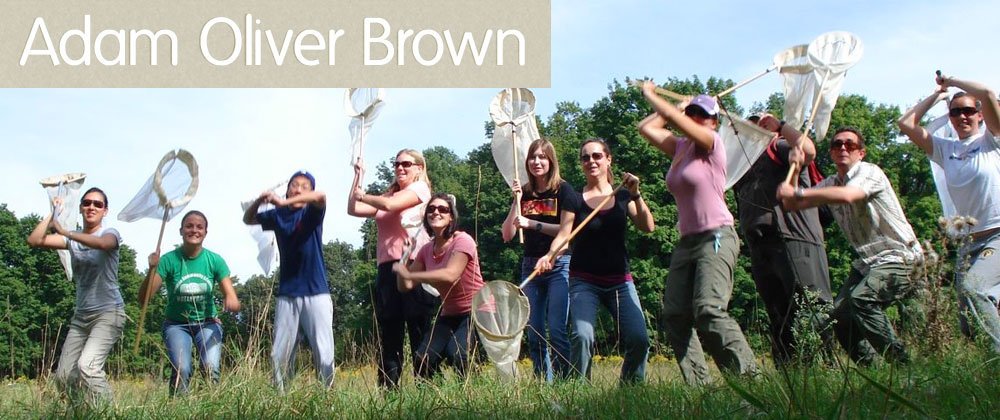BIO 3333 Entomology
Course Description
A comprehensive study of the largest class of animals – the insects. Morphological structure, physiology and system organisation are combined with discussions of insect diversity – ecology and their impact on the human species. Laboratory involves investigations of representative groups.
Classes
Lectures will be recorded and posted asynchronously to Brightspace
We will meet in-person for the lab each Monday from 2:30-5:30pm in BSC 110.
Office Hours
I will be in my virtual office on Thursdays from 11-12 for you to drop in to ask questions or to chat about life, the universe and everything. Please email me and I will send you a Zoom link for our discussion.
Communication
Occasionally, I will be required to contact you by email with some info about the course. Please note that it is your responsibility to check your uottawa email regularly and to respond within a reasonable delay. You may consult these regulations surrounding email contact at uOttawa here.
Evaluation
Midterm 1 (Tuesday Feb 1st): 10 or 20%
Midterm2 (Tuesday March 1st): 10 or 20%
Midterm3 (Tuesday April 5): 10 or 20%
(your best 2 midterms will be worth 20% each and your worst will be worth 10%)
Lab: 40%
Final Paper (due April 14 @ 5pm): 10%
Exam content
The exams will mostly concentrate on higher levels of interpretation of the lecture material, such as comparisons and contrasting, as well as interpretations, analysis and synthesis, rather than listings of terms or regurgitation of facts.
Note policy for missed midterms: If you miss a midterm due to a medical emergency (only with valid medical certificate), there will be no make-up test. Instead there will be questions from that midterm’s material incorporated into your final exam so that all students in the class will be tested on all the course material equally. If you miss a midterm, it is your responsibility to bring me your medical exemption note within 3 (three) days or else you will receive a mark of 0 (zero) on the test.
Also note that late penalties apply to missed deadline at 10% per school day deducted from the evaluation in question.
Textbook

I will be using a few sources for the material in this course but the main textbook that will be used is Insects: An Outline to Entomology by Gullan & Cranston (5th ed). I will be using the figures and content in this book to build most of the lectures and in my slides. You may use an earlier edition if you want, or even one of many other entomology textbooks. However, it will be your responsibility to make sure that you are learning the necessary material as it is presented in the lectures and labs.
.
.
.
Lectures
I will record the theoretical material for this course and post it online on Brightspace in small to medium-sized segments. They will remain online all term so you can view and review them at your leisure.
I will also post lecture notes below to accompany the lecture videos. Students may also get a head-start on their required readings, as the lectures will follow the order below in the textbook.
Topic 1: The evolution and ecology of insects
Notes in a single slide per page or 3 slides per page or 6 slides per page format
Topic 2: External anatomy
Notes in a single slide per page or 3 slides per page or 6 slides per page format
Topic 3: Internal anatomy and physiology
Notes in a single slide per page or 3 slides per page or 6 slides per page format
Topic 4: Sensory systems and behaviour
Notes in a single slide per page or 3 slides per page or 6 slides per page format
Topic 5: Reproduction
Notes in a single slide per page or 3 slides per page or 6 slides per page format
Topic 6: Development and life-histories
Notes in a single slide per page or 3 slides per page or 6 slides per page format
Topic 7: Plant-insect interactions
Notes in a single slide per page or 3 slides per page or 6 slides per page format
Topic 8: Social insects
Notes in a single slide per page or 3 slides per page or 6 slides per page format
Topic 9: Predation and parasitism
Notes in a single slide per page or 3 slides per page or 6 slides per page format
Topic 10: Insect defence
Notes in a single slide per page or 3 slides per page or 6 slides per page format
Final Paper
You will have one week after the last class (due Thursday April 14 @ 5pm by email) to write 2 pages (+title page and bibliography) on any topic of insect biology that interests you (12 pt font, double spaced). This will be written in the format of a scientific essay and must include sufficient references from a variety of primary research sources to justify the claims made in the body of the written work. The formatting must be done according to APA guidelines, which are the standard for professional scientific writings.
Lab Schedule of Activities
Lab coordinator: Stéphanie Mathieu (contact email here)
You will need to bring you lab coat, goggles, dissection kit, ruler and a sharpie marker to each lab.
January 17 – Introduction and set up for Manduca experiment
January 24 – Identification of insects and other arthropods
January 31 – Identification of Coleoptera and Blattodea Families
February 7 – Internal anatomy: cockroach dissection
February 14 – Bean beetle experiment & Manduca observations
February 21 – Reading Week
February 28 – Identification of beneficial insects and crop pests
March 7 – IPM experiment and Manduca observation
March 14 – Mounting and preservation & Identification of Lepidoptera Families
March 21 – Identification of Diptera and other fly-like Families
March 28 – Drosophila experiment
ANISHINÀBE
Ni manàdjiyànànig Màmìwininì Anishinàbeg, ogog kà nàgadawàbandadjig iyo akì eko weshkad. Ako nongom ega wìkàd kì mìgiwewàdj.
Ni manàdjiyànànig kakina Anishinàbeg ondaje kaye ogog kakina eniyagizidjig enigokamigàg Kanadàng eji ondàpinangig endàwàdjin Odàwàng.
Ninisidawinawànànig kenawendamòdjig kije kikenindamàwin; weshkinìgidjig kaye kejeyàdizidjig.
Nigijeweninmànànig ogog kà nìgànì sòngideyedjig; weshkad, nongom; kaye àyànikàdj.
ENGLISH
We pay respect to the Algonquin people, who are the traditional guardians of this land. We acknowledge their longstanding relationship with this territory, which remains unceded.
We pay respect to all Indigenous people in this region, from all nations across Canada, who call Ottawa home.
We acknowledge the traditional knowledge keepers, both young and old.
And we honour their courageous leaders: past, present, and future.
Discussion Guidelines
- Be constructive. Make your point, stay on topic, and don’t forget to complete the task as directed. Take your posts seriously and review and edit your posts before sending. Cite your sources, just as you would for a paper or a face-to-face discussion.
- Be active. Participate and contribute to the discussions and read all messages in a thread before replying. Don’t repeat someone else’s post without adding something of your own to it. Avoid short, generic replies such as, “I agree.”, include why you agree or add to the previous point.
- Be open-minded. Always be respectful of others’ opinions even when they differ from your own. Challenge ideas rather than the individual who offered them. Approach discussions with the goal of increasing everyone’s knowledge.
University Policies
Prevention of Sexual Violence
If you feel unsafe, call 9-1-1 or reach out to campus protective services at 613-562-5411.
The University of Ottawa has a zero-tolerance policy for any sexual act or act targeting a person’s sexuality, gender identity or gender expression. This includes both physical and psychological acts that are committed, threatened, or attempted against a person without the person’s consent, such as sexual assault, sexual harassment, stalking, indecent exposure, voyeurism, sexual exploitation, and cyberbullying. The University, as well as various employee and student groups, offers a variety of services and resources to ensure that all uOttawa community members have access to confidential support and information, and to procedures for reporting an incident or filing a complaint. For more information, please visit https://www.uottawa.ca/sexual-violence-support-and-prevention/
Academic Accommodations
The Human Rights Office and the Student Academic Success Service (SASS) support students to remove barriers to accessibility. The University has always strived to meet the needs of individuals with learning disabilities or with other temporary or permanent functional disabilities (hearing/visual impairments, sustained health issues, mental health or learning disabilities), and the campus community works collaboratively so that you can develop and maintain your autonomy, as well as reach your full potential throughout your studies. You can call on a wide range of services and resources, all provided with expertise, professionalism and confidentiality.
If barriers are preventing you from integrating into university life and you need adaptive measures to progress (physical setting, arrangements for exams, learning strategies, etc.), contact:
- (currently unavailable) visiting the SASS Academic Accommodations office on the third floor of the Desmarais Building, Room 3172
- logging into the Academic Accommodations Portal (Ventus) and completing the intake form
- calling the SASS Academic Accommodations office at 613-562-5976
Deadlines for submitting requests for adaptive measures during exams:
- Midterms, tests, deferred exams: seven business days before the exam, test or other written evaluation (excluding the day of the exam itself
- Final exams:
- November 15 for the fall session
- March 15 for the winter session
- Seven business days before the date of the exam for the spring/summer session (excluding the day of the exam itself).
Justification of absence from an examination (mid-term, final, supplemental or deferred) or from a test, or of late submission of assignments
Absence from any examination or test, or late submission of assignments on medical grounds or due to exceptional personal circumstances must be justified; otherwise, students will not be given the opportunity to complete the missed examination or test or to submit late assignments.
See regulation 9.5 for more information…
Forum
Visit the discussion forum often to view questions, answers, exam details and other interesting info relating to courses. You'll need to register and login to participate.
Veuillez visiter le forum de discussion réguliérement pour voir des questions, des réponses, les détails pour examens ainsi que d'autres infos pertinentes aux cours. Il faut s'inscrire et connecter pour participer.


